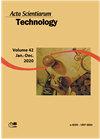A modified mode shape data-based method for beams structural damage detection
IF 0.6
4区 综合性期刊
Q3 MULTIDISCIPLINARY SCIENCES
引用次数: 0
Abstract
Damage detection methods based on changing modal parameters have received considerable attention in engineering applications due to the satisfactory results and the low associated cost compared with other techniques. The Mode Shape Data Based Indicator (MSDBI) is a damage indicator available in the literature, being used to identify damage in beam structures from the mode shape, mode shape slope and mode shape curvature, in the undamaged and damaged configurations of the element under study. However, in some situations, the configuration of the displacement mode shape of the ith mode, of the undamaged structure compared to the damaged one, presents mirroring. The damage identification algorithm could be a better indicator when these situations occur. Them, this paper presents a proposal to modify this method, called MSDBIM. The proposed modified method (MSDBIM) and the traditional method (MSDBI) were applied in two numerical examples that were elaborated in commercial software of finite elements, namely a simply supported concrete beam and a fixed-end steel beam in different single and multiple damage scenarios with sensitivity studies. A new discretization for the fixed-end beam was performed to assess whether there is a direct influence on the damage identification method. The results show that the proposed method (MSDBIM) performs better than the traditional method (MSDBI).基于改进模态振型数据的梁结构损伤检测方法
与其他方法相比,基于变模态参数的损伤检测方法具有较好的检测效果和较低的成本,在工程应用中受到了广泛的关注。基于模态振型数据的指标(MSDBI)是一种可在文献中找到的损伤指标,用于在研究单元的未损伤和损坏配置中,从模态振型、模态振型斜率和模态振型曲率来识别梁结构的损伤。然而,在某些情况下,与受损结构相比,未损伤结构的第i模态的位移模态振型的构型呈现镜像。当这些情况发生时,损伤识别算法可能是一个更好的指标。因此,本文提出了一种改进该方法的建议,称为MSDBIM。将本文提出的改进方法(MSDBIM)和传统方法(MSDBI)分别应用于有限元商业软件中阐述的简支混凝土梁和固定端钢梁两种不同单一和多重损伤情景的数值算例中,并进行了灵敏度研究。对固定端梁进行了新的离散化,以评估是否存在直接影响损伤识别方法。结果表明,所提方法(mssdbim)的性能优于传统方法(MSDBI)。
本文章由计算机程序翻译,如有差异,请以英文原文为准。
求助全文
约1分钟内获得全文
求助全文
来源期刊

Acta Scientiarum-technology
综合性期刊-综合性期刊
CiteScore
1.40
自引率
12.50%
发文量
60
审稿时长
6-12 weeks
期刊介绍:
The journal publishes original articles in all areas of Technology, including: Engineerings, Physics, Chemistry, Mathematics, Statistics, Geosciences and Computation Sciences.
To establish the public inscription of knowledge and its preservation; To publish results of research comprising ideas and new scientific suggestions; To publicize worldwide information and knowledge produced by the scientific community; To speech the process of scientific communication in Technology.
 求助内容:
求助内容: 应助结果提醒方式:
应助结果提醒方式:


